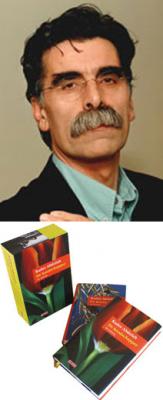
The holy book of Muslims, the Quran, is a much discussed book in our post- 9-11 era, whether it involves Jihadist ideology, social or cultural discussions or alternate interpretations in the context of the 21st century, the book raises emotions and questions.
Certain politicians express their fear of the actual practice of “codes of conduct” that are prescribed in the Quran. Intellectuals use verses from the Quran to point out the dangers of Islam as a religion in Western society, imagining the use of the holy book as a sort of “manual of life” for those who submit themselves to Allah.
In short, the Quran did not have a very friendly image in general Western context. Time for an “extreme makeover”, that must have been the line of thought of Kader Abdolah (Arak, 1954), the author of “The Quran and the Messenger”.
Abdolah, or Seyed Hossein Sadjadi Ghaemmaghami Farahani as his real name is, writes Dutch novels since 1993. He arrived in The Netherlands in 1988 as a political refugee and bravely started a career as a novelist. His column “Mirza” in the Dutch daily newspaper “De Volkskrant” shows the way he perceives social developments in The Netherlands through the eyes of an immigrant, an Iranian and sometimes a(n)(ex-)Muslim.
His novels managed to rise above the intimate circle of “migrant authors” and received the recognition and sympathy of many Dutchmen. His book “The House of the Mosque” (2007) was called out as the second best novel in Dutch literary history, which is a great achievement for someone who is still learning the Dutch language!
His “The Quran and the Messenger” is a simplified version of the Quran combined with the story of the prophet’s life, in a twin series. Mohammad becomes an actual person in this book, which makes it very different from all other writings by Muslims in which the prophet is portrayed as an infallible being.
Abdolah is aware of the fact that this novel would never be published in Muslim countries, because it would be seen as blasphemous to alter anything from the original Quran or even write about the prophet as if he were an ordinary individual.
What Abdolah tried to do was to give the Quran a friendlier face, by changing sura’s from its harsh character into more peaceful interpretations. He also added Dutch elements to the book to make it more appealing for the Dutch reader.
Critics say that he is fooling the people who read this with a biased view on Islam. Others say that he makes Islam more understandable and might even soften the Islam debates when people read and understand the true core of Islam.
By changing the chronology of the sura’s, he adds a certain storyline element that makes it easy for the reader to follow. In a way one could compare his book with the existing “children’s bibles” that Christians use to educate about the religion through storytelling.
Perhaps Abdolah has made one of the few first steps towards the “coming of age” of the Islam religion in Western society, or what others might call “the enlightenment of Islam”. If so, his book might have to be translated into more languages, than the average six languages which has become his norm.






